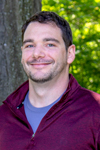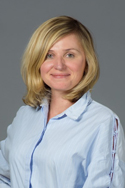Daniel Steiner Wins The Sayeeda Zain Fall 2020 Travel Award
Friday, December 4, 2020

Congratulations to Dan Steiner for winning a Sayeeda Zain Fall travel award. Dan is planning to attend the SPIE Photonics West meeting, to be held at the Moscone Center, San Francisco, California, March 6-11, 2021, He states "I am excited to represent our department and present my work in San Francisco (virtually or otherwise) . Networking and reaching out to labs and PIs at this conference will help me learn more about the entrepreneurial side of science and how to develop my career after I defend." The Sayeeda Zain Travel Award honors the distinguished career and charitable life of Dr. Sayeeda Zain. The award is given in recognition of research excellence to support expenses associated with attendance at a scientific conference or corporate internship to gain practical experience. Dan Steiner is a Biophysics graduate student studying in Dr. Ben Miller's lab
Benjamin Miller is in this year’s class of Optical Society (OSA) Fellows
Thursday, October 22, 2020
This year's class of Optical Society (OSA) Fellows includes Jake Bromage, a senior scientist at the Laboratory for Laser Energetics; Michael Campbell, director of the Laboratory for Laser Energetics; John Marciante, an associate professor of optics; and Benjamin Miller, Dean's Professor of Dermatology and a professor of biomedical engineering, optics, and biochemistry and biophysics. Fellows are selected for a range of achievements in the field of optics and photonics.
Congratulations Ben!
Awad, McGrath and Miller receive a $4M NCATS/NIAMS Clinical Trials on a Chip grant to study tendon inflammation and fibrosis
Tuesday, September 29, 2020
Clinical Trials on a Chip researchers plan to build and test common and rare disease models to help improve the clinical trial process.
Approximately 85% of late-stage clinical trials of candidate drugs fail because of drug safety problems or ineffectiveness, despite promising preclinical test results. To help improve the design and implementation of clinical trials, the National Institutes of Health has awarded 10 grants to support researchers' efforts in using tiny, bioengineered models of human tissues and organ systems to study diseases and test drugs. One major goal of the funded projects is to develop ways to better predict which patients are most likely to benefit from an investigational therapy prior to initiating clinical trials.
The awards total more than $6.9 million in the first year, and approximately $35.5 million over five years, pending available funds. They are administered through a new program, Clinical Trials on a Chip, which is led by NIH's National Center for Advancing Translational Sciences (NCATS) in conjunction with several other NIH Institutes and Centers, including the National Cancer Institute, the National Institute of Child Health and Human Development, and the National Institute of Arthritis and Musculoskeletal and Skin Diseases.
Tissue chips, or organs-on-chips, are 3-D platforms engineered to support living human tissues and cells and mimic complex biological functions of organs and systems. Tissue chips are currently being developed for drug safety and toxicity testing and disease modeling research, including on the International Space Station. Clinical Trials on a Chip is one of several initiatives that are a part of the NCATS-led Tissue Chip for Drug Screening program, which was started in 2012 to address the major gaps in the drug development process.
Graduate Student Viktoriya Anokhina Elected Co-Chair of Gordon Research Seminar
Monday, May 11, 2020

Congratulations to Viktoriya Anokhina who was elected as a co-chair of the Gordon Research Seminar Nucleosides, Nucleotides and Oligonucleotides, to be held in 2021. The Gordon Research Seminar is a 2-day meeting that precedes a Gordon Research Conference. These seminars are organized by early-career scientists for trainees of all levels and junior scientists. Some of Viktoriya's responsibilities as a co-chair will include Keynote speaker selection and invitation, career panel participants invitations, fundraising, selection of speakers from submitted abstracts, and other organizational activities. To attend the 2019 meeting, Viktoriya was supported by the Sayeeda Zain and Graduate Women in Sciences travel awards.
Rochester researchers pursue quick ways to detect COVID-19—and better understand it
Tuesday, April 21, 2020
University scientists are adapting existing research to develop tests to detect and improve our understanding of COVID-19. Examples include projects led by Martin Zand, senior associate dean for clinical research at the Medical Center; Benjamin Miller, a professor of dermatology and biomedical engineering; and James McGrath, a professor of biomedical engineering.
Zand is working on the finger-stick test, which uses patented technology that detects immunity to more than 50 strains of flu. The test comes in an easy-to-mail kit similar to those that test blood sugar for diabetes. "We're hoping this could make COVID-19 vaccine trials faster and more convenient for those who volunteer for them," says Zand.
Miller's lab hopes to find the virus with optics at the nanoscale. The lab is developing tiny sensor chips that use coronavirus proteins to "very quickly" detect the presences of immunoglobulin G and M antibodies that humans develop within two days of exposure to the virus. "The problem right now is actually getting patient samples," says Miller. "Meanwhile we are optimizing our assays with 'normal' serum samples doped with coronavirus antibodies—basically making artificial patient samples."
McGrath is using ultrathin membranes—less than 200 nanometers thick—to determine whether individuals have been infected with COVID-19. He can apply the membranes as a sensor and as a platform for discovering pathogenic mechanisms. McGrath is eyeing an inexpensive device similar to a pregnancy test that could be used in low-resource communities around the world.
"It will likely take more than a year to develop a vaccine, so COVID-19 is going to be with us for some time," says McGrath. "If we move quickly but deliberately, I think the device could be ready in time to help with the current pandemic."
Two Rochester scientists earn national recognition for excellence in engineering
Saturday, April 4, 2020
Two faculty members at the University of Rochester—Benjamin Miller and Marvin Doyley—have been inducted as fellows of the American Institute for Medical and Biological Engineering (AIMBE).
The institute's College of Fellows is composed of the top 2 percent of medical and biological engineers, who are employed in academia, industry, clinical practice, and government.
As a result of health concerns, AIMBE's annual meeting and induction ceremony scheduled for March 29-30 was canceled, but Miller and Doyley were remotely inducted as part of a total of 156 fellows who make up the Class of 2020.
Marvin Doyley, professor of electrical and computer engineering with joint appointments in biomedical engineering, and imaging sciences, was selected for "outstanding contributions in developing algorithms for elastography and the application of elastography to vascular mechanics and disease."
Doyley joined the University of Rochester in 2008. His Parametric Imaging Research Laboratory develops novel imaging methods for detecting disease more quickly and for determining how well patients are responding to therapy. Doyley's primary research interests include cardiovascular imaging, breast cancer imaging, ultrasound beamforming, contrast-enhanced ultrasound imaging, ultrasound elastography, magnetic resonance elastography, and pancreatic cancer imaging.
"It is an honor to be named an AIMBE fellow, which is due to the hard work of my research groups, past and present," Doyley says.
Doyley was also one of 20 faculty members nationwide recently selected for the first cohort of the IAspire Leadership Academy, a program aimed at helping STEM faculty from underrepresented backgrounds ascend to leadership roles at colleges and universities.
Benjamin Miller, the Dean's Professor of Dermatology with joint appointments in biomedical engineering, biochemistry and biophysics, and optics, was selected for "the development and application of versatile optical biosensor platforms, including Arrayed Imaging Reflectometry and integrated photonic sensors."
Miller, who was also recently named a fellow of the American Association for the Advancement of Science (AAAS), joined the Rochester faculty in 1996. He is focused on two areas of research: how molecules recognize RNA sequences; and how the optical properties of nanomaterials might aid in the development of new biosensors for biological investigations and clinical screenings. The Miller lab hopes to pave the way toward compact, inexpensive biosensors that could replace current floor-standing clinical diagnostic systems with a cell phone--sized device.
"Being named an AIMBE Fellow recognizes the hard work my students and other group members have done over the years," Miller says, "and I hope it will spur us to continue to make new diagnostic tools for improving human health."